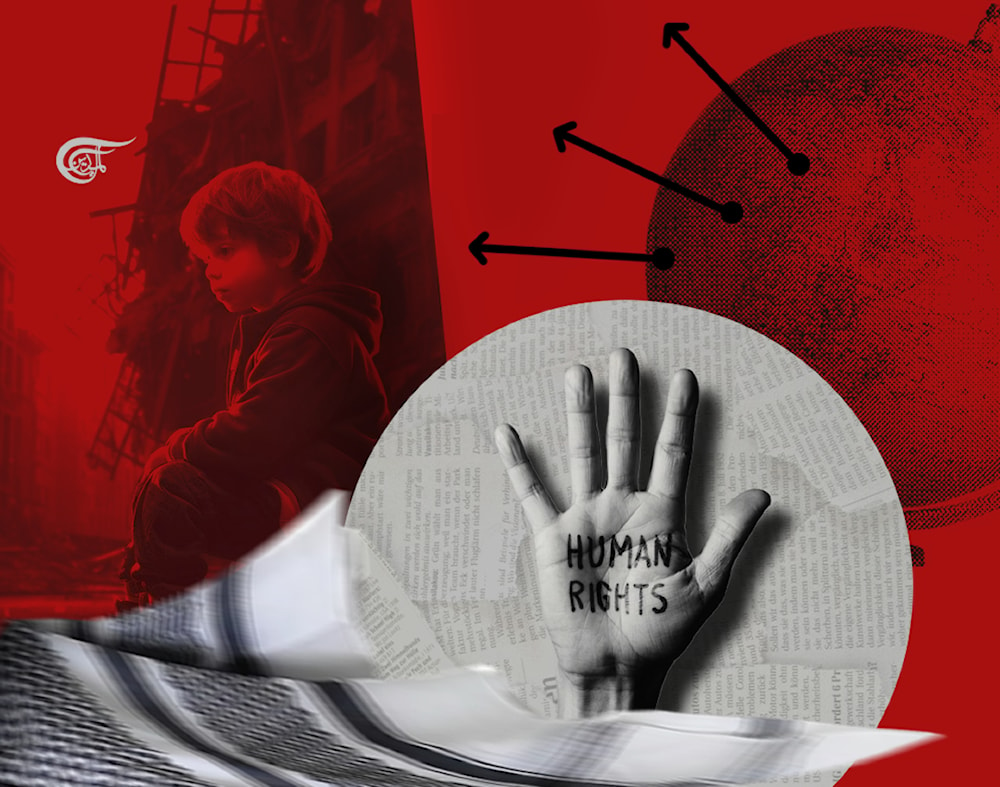More reflections on multipolarity
An analysis of Samir Amin's four criteria in "National States: What is the Way Forward?."
-

How multipolarity may form and develop (Illustrated by Arwa Makki; Al Mayadeen English)
The four criteria of a ‘reliable’ multipolar world, as posited by Samir Amin are as follows: Europe should chart an independent path from the Atlanticist one it has treaded for 400 years, China should redouble its efforts at socialist construction intentionally, the countries of the South should revive the Bandung legacy of a ‘united front’, and a reorganization of national and international systems of rights.
In this article, I hope to revisit these four criteria in light of new international developments since the death of the great Egyptian thinker.
Namely, Russia’s special military operation in Ukraine, Operation Al-Aqsa Flood in Palestine, and China-US relations will factor importantly in this analysis.
Samir Amin put forward this analysis of multipolarity in his work "National States: What is the Way Forward?" which briefly summarizes the history of capitalist imperialism in its successive phases: firstly, the wave of colonialism which constituted the first advance of Atlanticist power; secondly, the period from the 19th century to the world wars, where this power was solidified around the Atlantic; thirdly, the post-war period and reorganization of the global power structure (neoliberalism and the imperialism of the triad); and lastly, the qualitatively new phase we find ourselves in during this 21st century.
Throughout these phases, there have also been openings for anti-systemic movements to gain steam. During the post-war period, the renascent states of Africa, Asia, and Latin America met at Bandung and asserted the need for a radically new world order. This meeting, according to Amin, was conducted at a time when there was still a great disparity in technological advancement between the imperialist triad and the countries of the South. This disparity–while not totally gone–has been dramatically reduced in recent years through the rise of BRICS powers who have been able to spread some of this industrial advancement to the states in their immediate sphere of influence. From here, we can now begin an analysis of the 4 criteria laid out by Amin, starting with point number 3, the reawakening of the Global South.
The awakening of the Global South has begun at several junctions that are critical to the geometry of imperialism. Beginning in 2021, a number of coups d’état led by anti-colonial, nationalist segments of the military struck West Africa. Mali, Niger, and Burkina Faso represent the vanguard of this historical movement, while Guinea-Conakry and Gabon remain in a zone of indeterminacy regarding the direction of their military governments. These movements are supported by the popular classes and represent their rebuke of years of French neocolonialism, yet the historical limits of the national bourgeoisie at this time are evident in the structures already set up by the colonialist forces. The CFA Franc system and the ‘African EU’ in the form of ECOWAS present themselves as great obstacles for the people and governments of these renascent states.
The existence of Sankarist elements in the current Burkinabe government, and Mali’s closer ties with Russia and DPRK do provide a spot of hope in an otherwise uphill battle. Meanwhile, at the ‘gate to Africa and bridge to Asia,' the Palestinians are in the process of securing a historic victory against the Zionist usurpers. According to Scott Ritter, Operation Al Aqsa Flood is “the most professionally executed, large-scale raid carried out by a light infantry force in modern history." The capture of dozens of Zionist soldiers gives the Resistance forces a bargaining chip, the largest of which has been seen since the capture of Gilad Shalit.
If we imagine that war is politics by other means, as asserted by Ritter and Clausewitz before him, then Operation Al Aqsa Flood has indeed opened wide the door of political victories to accompany this one on the battlefield. The release of all Palestinian prisoners and the reality of a Palestinian state from the river to the sea are in our field of vision, if not yet in our grasp. This brings us to Amin’s point that currently “...there is a great need to route Washington’s military project." This is being done in part by the Palestinians vis-a-vis the military victory over the USA’s imperial outpost in West Asia. In another arena, the Russian advances in Ukraine can potentially accelerate the end of Washington’s global military project. Here, the potential dissociation of Europe from the Atlanticist power matrix can be examined.
Since the beginning of Russia’s special military operation in Ukraine, Europe has not deviated from the Atlanticist line developed in Washington and Brussels. The only exceptions are a few right-populist regimes and Europe’s last Soviet outpost, Belarus. Despite setbacks in West Africa and unsustainable spending, Paris has not been able to revisit a De Gaullian strategic autonomy to rebuke the NATO death machine. Berlin is deindustrializing rapidly while ensuring cash and weapons flow into Kiev. Meanwhile, London is sending depleted uranium rounds to the Kiev clique, yet domestically 1 in 7 people are facing hunger. In Slovakia, the new PM Robert Fico has sworn that his country will not send any more ammunition to Ukraine. While it is still unknown if Fico will last or be deposed in a color revolution, the point remains that Europe is still firmly entrenched in “Atlanticism and extreme neoliberalism." The social project of rebuilding Europe has been put on pause for the time being. Before Russia’s SMO, Merkel and Macron were dabbling in strategic autonomy by warming up to Beijing, while Italy and a few Eastern European countries joined the Belt and Road Initiative. This level of autonomy has not, however, spread on a European scale. Now, we turn to China, its path to socialism, and the prospects for the advancement of human civilization.
Amin placed high hopes in China’s role as a powerful pole in a multipolar world, although he also understood that class struggle–nationally and internationally–is the motor of history, and as such, there are dangers on the path of China’s rise. Amin hoped that Chinese ‘market socialism’ would remain in the driver’s seat and keep the liberal nationalists and pro-Western elements at bay. Thus far, if we examine the time from Amin’s death (2018) to the present day, it seems as if these market socialist trends are continuing along. According to Elias Jabbour: “[t]his process is evidenced in the continuous expansion...of government control over national income flows."
This trend is also observed in the fall of the private sector investment rate (from 34.8% of total investments in 2011 to 2.8% in June 2016). This process of favoring state-owned enterprises, reinvesting nationally and intentionally developing the interior regions had tremendous success in helping China combat COVID-19 and still eliminate extreme poverty. Socialism with Chinese characteristics has been beneficial for the people of China. The Chinese government “constantly generates jobs and plans and distributes employment opportunities to meet social needs such as health, education, and housing." This, coupled with State ownership of land, strategic natural resources, and banks, allows the Chinese people to see year-on-year increases in their standard of living. Recently, China has been able to bring Iran and Saudi Arabia to the table to thaw relations. On this note, it is important to note that Chinese-Israeli bilateral trade is valued at $24.45 billion. If we are to move towards Amin’s ‘reliable multipolarity’, it is important that China use its economic clout on the global scale to isolate the Zionist regime and sanction them for the genocide they are conducting as this is being written.
The fourth criterion put forward by Samir Amin is the loftiest. Amin argues that we need to reorganize the international system of rights from a system that favors the rights of national sovereignty to a system that favors the sovereignty of “the people and individual, collective, political and social rights." So long as the capitalist-imperialist system and NATO military powerhouse exist and promote globalization that is harmful to the peoples of the global South, the rearranging of rights will be an uphill battle. Yet, so long as there are powerful anti-systemic states and movements, the imperialist division of the world continues to be challenged. In sum, two of the four criteria put forward by Amin have qualitatively advanced since the time of his death 5 years ago. Renascent states and movements of the South are exerting their sovereignty, and China is exercising its power globally and continuing its market socialist system internally. What remains to be seen are the qualitative changes that can allow Europe to begin “dissociating from its imperialist past and present” and thus change the international system of rights and responsibilities.

 Hanna Eid
Hanna Eid
 8 Min Read
8 Min Read











